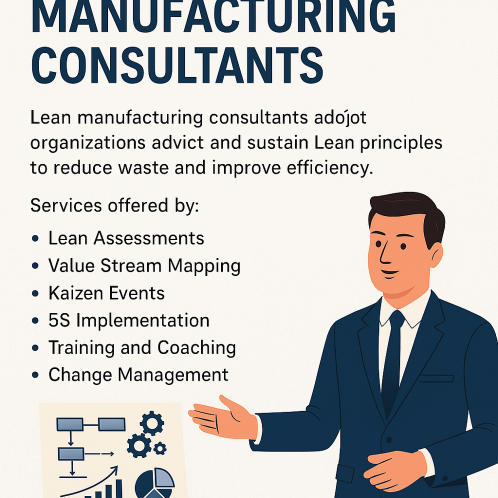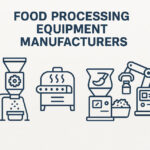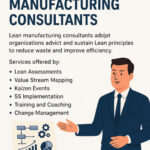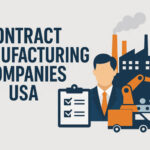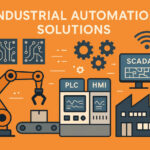In today’s fast-paced and competitive industrial world, manufacturers face constant pressure to deliver high-quality products faster, cheaper, and more efficiently. This drive for excellence has led many organizations to adopt Lean Manufacturing—a powerful system that focuses on reducing waste, increasing productivity, and creating customer value.
However, implementing Lean principles successfully is not easy. It requires a deep understanding of processes, human behavior, and long-term change management. That’s why many companies turn to Lean Manufacturing Consultants—experienced professionals who guide them through every step of their Lean journey.
In this comprehensive guide, you’ll learn:
- What Lean Manufacturing is
- Who Lean consultants are
- What services they offer
- Benefits of hiring a consultant
- How to choose the right one
- Common challenges and solutions
- Future trends in Lean consulting
What Is Lean Manufacturing?
Lean Manufacturing is a philosophy and methodology focused on maximizing customer value while minimizing waste. Originally developed by Toyota in the mid-20th century as the Toyota Production System (TPS), Lean has become a global standard in industries like automotive, aerospace, electronics, healthcare, and consumer goods.
The core five principles of Lean are:
- Define Value – Understand what the customer truly wants and is willing to pay for.
- Map the Value Stream – Identify every step in the process and eliminate those that don’t add value.
- Create Flow – Ensure that work flows smoothly through processes without interruptions.
- Establish Pull – Produce only what is needed, when it’s needed, based on real customer demand.
- Pursue Perfection – Continuously improve every aspect of operations.
Lean eliminates eight types of waste, often summarized by the acronym DOWNTIME:
- Defects
- Overproduction
- Waiting
- Non-utilized talent
- Transportation
- Inventory
- Motion
- Extra-processing
Who Are Lean Manufacturing Consultants?
Lean Manufacturing Consultants are professionals with deep knowledge of Lean tools, techniques, and principles. They help companies:
- Assess their current processes
- Identify opportunities for improvement
- Implement Lean systems
- Train employees
- Drive continuous improvement
These consultants often have backgrounds in engineering, operations, supply chain, or quality management, and hold certifications such as:
- Lean Six Sigma Black Belt
- Certified Lean Practitioner
- Kaizen Facilitator
Some work independently, while others are part of consulting firms that specialize in manufacturing excellence. Their goal is to guide organizations toward operational excellence.
Services Offered by Lean Manufacturing Consultants
Lean consultants tailor their services based on the needs of each client. Below are the most common offerings.
1. Lean Assessments
- Evaluate current production, logistics, and administrative processes
- Identify areas of waste and inefficiency
- Develop a Lean maturity score or roadmap
2. Value Stream Mapping
- Create visual maps of material and information flow
- Highlight non-value-added steps
- Design future-state processes that are more efficient
3. Kaizen Events
- Facilitate focused, short-term improvement workshops
- Use cross-functional teams to solve specific issues
- Implement changes immediately and measure results
4. 5S Workplace Organization
- Sort, Set in Order, Shine, Standardize, Sustain
- Create clean, organized, and efficient work environments
- Improve safety, efficiency, and employee satisfaction
5. Just-in-Time and Kanban Systems
- Align production with real-time customer demand
- Reduce inventory, lead times, and storage costs
- Implement pull-based scheduling using visual cards or signals
6. SMED (Single-Minute Exchange of Dies)
- Minimize equipment setup and changeover time
- Increase machine availability and flexibility
- Improve overall equipment effectiveness (OEE)
7. Employee Training and Leadership Coaching
- Educate staff on Lean principles and tools
- Build internal improvement teams
- Train managers to lead and sustain Lean culture
8. Visual Management Systems
- Create dashboards and floor displays
- Track key performance indicators (KPIs)
- Improve decision-making and transparency
Benefits of Hiring a Lean Manufacturing Consultant
Hiring a Lean consultant brings more than technical skills—they bring experience, objectivity, and a fresh perspective.
Faster Results
Consultants know where to look for improvement opportunities and can implement quick wins that show immediate impact.
Cost Reduction
Lean projects often lead to reduced labor costs, material waste, and downtime—resulting in direct savings.
Higher Productivity
By improving workflows and reducing bottlenecks, consultants help businesses produce more with the same or fewer resources.
Better Quality
Lean encourages standardized work, root cause analysis, and continuous improvement, all of which drive higher quality outcomes.
Stronger Employee Engagement
Consultants teach employees how to identify problems, suggest solutions, and take ownership of improvements.
Competitive Advantage
Lean companies adapt faster to market changes, deliver quicker, and serve customers better—making them more resilient and profitable.
How to Choose the Right Lean Consultant
Not all Lean consultants are equally effective. When choosing one, consider the following:
Industry Experience
Have they worked in your industry or with similar companies?
Hands-On Approach
Do they work side-by-side with your team, or do they just provide reports?
Customized Strategy
Do they tailor their approach to your specific goals and culture?
Communication Skills
Can they explain Lean concepts clearly to all levels of the organization?
Track Record
Do they have documented success stories or references from other clients?
Long-Term Support
Will they help build internal capabilities to sustain improvements after their engagement ends?
Common Lean Implementation Challenges (and Consultant Solutions)
Even with the best intentions, Lean transformations can fail. Here’s how consultants help avoid common pitfalls:
Resistance to Change
Employees may feel threatened or skeptical. Consultants build trust through education, involvement, and transparency.
Lack of Leadership Buy-in
Without commitment from leadership, Lean efforts often stall. Consultants align strategy and execution by coaching senior management.
Poor Metrics and Data
Measuring the wrong things leads to poor decisions. Consultants help establish meaningful KPIs that guide improvement.
One-Size-Fits-All Tools
What works in one plant may not work in another. Consultants customize solutions for each client’s environment and culture.
Short-Term Thinking
Many companies expect instant results. Consultants focus on long-term value while delivering quick wins to build momentum.
Real-World Success Stories
Here are a few real-life examples of Lean consultants driving transformation:
Automotive Supplier
A Lean consultant introduced SMED techniques at a parts manufacturer. Changeover time was reduced by 75%, leading to a 30% increase in productivity.
Food Packaging Facility
After a Lean assessment, the consultant led 5S implementation and value stream mapping. Within three months, waste was reduced by 40% and customer complaints dropped by half.
Electronics Manufacturer
By adopting a Kanban pull system and reorganizing assembly lines, the company improved on-time delivery from 60% to 95% within six months.
Lean Tools Used by Consultants
Here is a summary of the key tools Lean consultants often introduce:
| Tool | Purpose |
|---|---|
| Value Stream Mapping | Identify waste and inefficiencies in processes |
| 5S | Organize workspaces for safety and efficiency |
| Kaizen | Continuous small improvements driven by teams |
| Kanban | Visual signals to manage flow and reduce inventory |
| SMED | Reduce setup and changeover times |
| Poka-Yoke | Error-proofing devices to prevent mistakes |
| Andon | Real-time alerts to signal problems on the floor |
| Gemba Walks | Observing work where it happens to identify issues |
| Standard Work | Documented best practices to ensure consistency |
| PDCA Cycle | Structured approach to problem-solving |
Future of Lean Manufacturing Consulting
Lean continues to evolve with new technologies and business environments. Consultants are embracing the following trends:
Digital Lean
Combining Lean principles with data analytics, dashboards, and digital twins to monitor and optimize production in real-time.
Industry 4.0 Integration
Using sensors, IoT, machine learning, and automation to eliminate new forms of waste and enable smarter decision-making.
Remote Consulting
Offering virtual training sessions, video-based Gemba walks, and cloud-based tools for global collaboration.
Sustainability and Green Manufacturing
Integrating environmental objectives with Lean by reducing energy use, minimizing scrap, and designing sustainable processes.
Conclusion
Lean Manufacturing Consultants play a critical role in helping companies improve operations, reduce waste, and build cultures of continuous improvement. Whether you’re just starting your Lean journey or trying to reinvigorate a stalled initiative, the right consultant can make a huge difference.
They bring the knowledge, tools, and support needed to guide real transformation—ensuring that improvements are not only achieved, but also sustained over time.
With growing global competition and rising customer expectations, investing in Lean consulting is no longer optional—it’s a strategic necessity.
Recommended Resources
- Lean Enterprise Institute: www.lean.org
- Kaizen Institute: www.kaizen.com
- The Lean Toolbox by John Bicheno
- The Toyota Way by Jeffrey Liker
